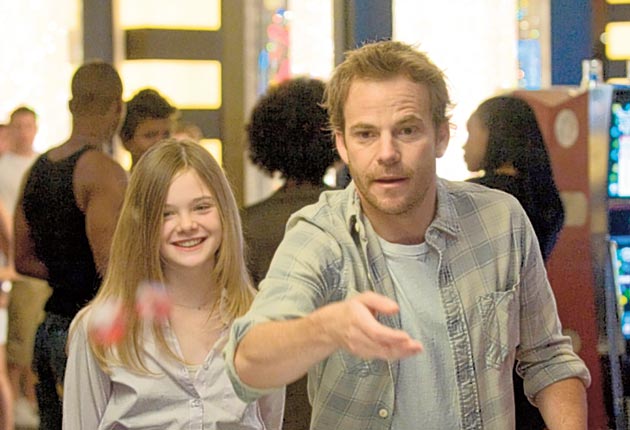First Night: Somewhere, Venice Film Festival
Coppola returns with a quirky tale of a girl and her famous dad

Your support helps us to tell the story
From reproductive rights to climate change to Big Tech, The Independent is on the ground when the story is developing. Whether it's investigating the financials of Elon Musk's pro-Trump PAC or producing our latest documentary, 'The A Word', which shines a light on the American women fighting for reproductive rights, we know how important it is to parse out the facts from the messaging.
At such a critical moment in US history, we need reporters on the ground. Your donation allows us to keep sending journalists to speak to both sides of the story.
The Independent is trusted by Americans across the entire political spectrum. And unlike many other quality news outlets, we choose not to lock Americans out of our reporting and analysis with paywalls. We believe quality journalism should be available to everyone, paid for by those who can afford it.
Your support makes all the difference.It isn't much fun being famous.
That, at least, is what Sofia Coppola's new film (screening in competition in Venice) suggests.
Its main character is Johnny Marco, played by Stephen Dorff. He is a movie star who has it all: money, a sports car, his choice of sexual partners. He lives in the Chateau Marmont Hotel in Los Angeles. His idea of home entertainment is to hire pole dancers who cavort in front of him as he lies in a stupor on his bed. Everybody wants a piece of Johnny. The irony is that his life is lonely and dysfunctional.
Coppola's achievement is to have made an affecting and quietly funny film about such an unsympathetic character. Somehow, she makes us care about the existential angst of a pampered celebrity living a deeply superficial life. After the formal extravagance of her period picture, Marie Antoinette, this is Coppola back in Lost In Translation mode. The storytelling is very understated. Shots – whether lap dances or games of Wii tennis – are often held for a small eternity. Dialogue is minimal.
Much of the humour comes from Johnny's deadpan reaction to what is going on around him, whether it's inane questions being thrown at him during a press conference, dancers swarming around him on Italian TV, or make-up artists plastering his face with cream so he can play a very old man. Dorff plays Johnny in genial, laidback fashion. (With a less engaging actor, Somewhere could easily have verged on the repellent).
The key moment comes when Johnny's ex-wife tells him she is going out of town, leaving him to look after his 11-year-old daughter, Cleo (played by Elle Fanning). With a kid on his hands, the movie star has to modify his hedonistic lifestyle at least a little. Predictably, he realises she means more to him than sex, gambling and booze.
Shot by Harris Savides (also the cinematographer on Noah Baumbach's Los Angeles-set Greenberg), Somewhere portrays LA as an impersonal and alienating city. Johnny may not be jet lagged and adrift in an alien culture – as Bill Murray was in Lost In Translation – but he still struggles to make sense of his surroundings.
Coppola has an eye for offbeat observation: neighbours in the hotel flirting outrageously with Johnny, wannabe actors pestering him at parties, publicists fussing around him. She also takes satirical sideswipes at the celebrity-obsessed media. In particular, the director looks at the Hollywood circus with an anthropological eye: this is a very bizarre world indeed, with strange hierarchies and rituals.
Thankfully, Coppola also avoids the mawkishness that could easily have crept into a story about a neglectful father bonding with his daughter. It helps that Elle Fanning is not the typical doe-eyed child star. She plays Cleo as a resilient kid who looks on at her father's excesses with a wry irony.
Coppola's film-making style is detached and low-key. Aside from one or two sequences in which father and daughter voice their unhappiness, the characters keep their emotions in check. One drawback to her approach is that there is never really a sense of transition or character development.
Johnny's character may be changing under the influence of his daughter, but he still seems the same coolly narcissistic figure at the end of the film as he was at the beginning. There is also the sense that he likes the celebrity lifestyle more than he is letting on. After all, the Chateau Marmont isn't exactly the Gulag.
Join our commenting forum
Join thought-provoking conversations, follow other Independent readers and see their replies
Comments